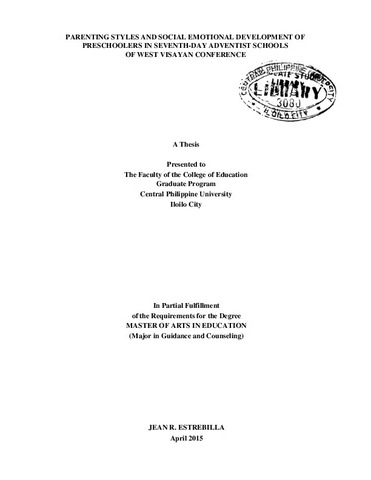| dc.description.abstract | The study was conducted to determine the relationship between parenting styles and social emotional development of preschoolers in Seventh-day Adventist (SDA) schools of West Visayan Conference (WVC). Specifically, it sought to determine the profile of the respondents in terms of age, sex, educational attainment, family income, and employment status; the profile of the preschoolers in terms of sex, birth order, and number of children in the family; the parenting style of the respondents; the social emotional development of preschoolers and determine if there is a significant relationship between age, sex, educational attainment, family income, employment status of the parents and the parenting style used; between the child sex, birth order, number of children in his/her family and the parenting style used; between age, sex, educational attainment, family income, employment status of the parents and the social emotional development of preschoolers; between the child sex, birth order, number of children in his/her family and the social emotional development of preschoolers; and between parenting styles and social emotional development of preschoolers.
This is a descriptive relational study which used the one-shot survey design. The respondents of the study were the mothers of the preschoolers enrolled during the SY 2013-2014 in the Kindergarten schools of the Seventh-day Adventists in West Visayan Conference territory and who have four to five year old children. These Kindergarten schools have an enrolment of not less than fifteen pupils. The 182 samples were drawn using stratified random sampling. Standardized questionnaires were used in data collection. The data were encoded and processed through Statistical package for Social Sciences (SPSS) version 20. Chi -square statistics was used to measure the relationship between variables.
The data showed that slightly more than half of the mothers were thirty- six years old and older, slightly more than two third of the mothers were college graduate, more than half were employed and had a monthly family income ranging from Pl 0.001 and above. There were about the same proportion of male and female preschoolers, almost half of them were eldest in the family and almost half belongs to a family with two siblings. In general, half of the mothers were authoritative (positive) parents. Almost half of the preschoolers were above cut-off/on schedule in social emotional development. A significant relationship was found between personal characteristics such as age, educational attainment, family income, employment status of mothers and parenting style used, between the child’s characteristics such as sex, birth order, number of children in the family and parenting style used, between age, educational attainment, family income, employment status of parents and social emotional development of preschoolers, between the child’s birth order and number of children in the family and the social emotional development of the child. However, when sex of the child was considered, no significant relationship was found between the sex of the child and their social emotional development. A significant relationship was found between parenting styles and social emotional development of preschoolers.
Based on the findings it was concluded that most of the demographic characteristics of mothers and preschoolers have significant bearing on parenting style and social emotional development respectively. Mothers who were older, more educated, employed and have higher income tend to have disciplinary methods that are supportive, rather than punitive. As a result, preschoolers tend to be more assertive, socially responsible, higher levels of academic achievement and have lower levels of behavioral problems. Mothers dealt with each child differently in terms of sex, birth order, and number of children in the family. Male preschoolers were more likely to be treated in stricter way than females, more importance were given to first bom than later bom, and children tend to receive more emotional resources and individualized parental attention in small families. Both boys and girls are more likely to demonstrate social emotional skills. Firstborn children tend to be less involved in delinquency than middle-born children and children who belong to families with less children tend be more confident.
It was concluded that parenting styles have significant bearing on social emotional development of preschoolers. Among the parenting styles, authoritative parenting was linked to a healthy social emotional development. | en_US |


